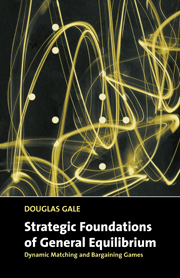4 - Bounded rationality
Published online by Cambridge University Press: 22 September 2009
Summary
In chapter 3, we appealed to a variety of notions of bounded rationality and simplicity to try to justify the special assumptions needed for the competitive limit theorem in chapter 2. These included the Markov property of equilibria used to characterize the equilibria of finite economies and the Continuity Principle imposed on the competitive sequences of equilibria.
If we take the idea of bounded rationality seriously, however, the complexity of these games is still very demanding. Furthermore, the assumption that the agents know not only their own equilibrium strategies but those of the other agents, is very demanding. Where do they get this information? Sometimes the common knowledge of equilibrium strategies is interpreted as the outcome of a process of introspective reasoning (Binmore, 1990, calls this eductive reasoning). Sometimes it is treated as the outcome of a process of learning by trial and error. Clearly, the eductive approach does not reduce the computational ability required of the agents. The trial-and-error approach may do so. Adaptive, rule-of-thumb behavior is less demanding both informationally and computationally. If it leads to equilibrium behavior, it may provide some support for the notion that boundedly rational individuals can acquire strategies that are close to equilibrium strategies.
In this chapter, I present an example of this kind of rule-of-thumb or adaptive behavior that leads not very bright agents to a competitive equilibrium.
- Type
- Chapter
- Information
- Strategic Foundations of General EquilibriumDynamic Matching and Bargaining Games, pp. 157 - 203Publisher: Cambridge University PressPrint publication year: 2000



